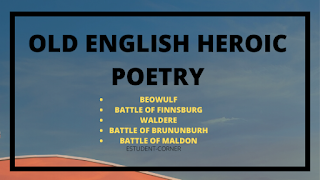Give an account of the old English heroic poetry. Mentioning all the major and minor war poems ?
The Germanic forefather of the Saxon , described by Tacitus lived in caves or primitive huts, and lived on hunting and robbing of more civilized neighbours. The fierce love for war and bloodshed in a barbaric manner, as recorded in Icelandic and Scandinavian Nibelungenlied, is much softened due to infusion of Christian spirit in the edited manuscripts of Anglo-Saxon war poems like , The Battle of Maldon and Battle of Brunanburh.
BEOWULF
The Epical Beowulf is definitely the greatest specimen of heroic poetry in old English . The poem relates the deeds of Beowulf , a valiant warrior of the people of Geats in southern Sweden, who sails from his homeland in Sweden to help Hrothgar , the king of the Danes , whose royal hall , Heorot is being regularly ravaged by a murderous cannibalistic human monster named Grendel, this is overcome by Beowulf in a memorable encounter but he escapes only to die from his grievous injuries in his mother’s cave dwelling under the water of a lake .Grendel’s mother carries on the depredations . Beowulf pursues her to her den. The another fierce fight Beowulf kills this monster . Then he return home to Sweden and is proclaimed king of the Geats. After a glorious reign of 50 years. Beowulf has to wage another heroic fight against a fire breathing dragon that had been devastating the countryside . He is successful in killing this menace and assuring happiness to his countrymen. But in the process he received a fatal wound , he meets the worthy ends of the a genuine hero .The poem ends with the burning of Beowulf's body the treasures he recovers from the dragon’s cave , on a funeral pure on a head-land , amid the lamentations of his people’s , a monumental borrow is built to perpetuate his memory. Beowulf character to built on large simple lines his passion for glory , his honest boasting as a warrior , his role of a disinterested crusader and purger of society.
BATTLE OF FINNSBURG AND WALDERE
Finnsburg and Waldere are two epic fragments the first , consisting of only 51 lines is conjectured to have been composed about AD 700 Finn, the son of a Frisian king , Treacherously attacked the Danes he himself had hosted.
Waldere is found in two fragments of 31 lines, each in the first part a woman called Hildegard is found encouraging Waldere to fight with his pursuers. Waldere and Hagen were teamed together ,but Hagena fled to the camp of Guthhere in the final battle, Guthhere lost a leg , Waldere his right hand and Hagena an eye.
Battle of Brunanburh & Maldon
A taste of the traditional heroic poetry of the Anglo-Saxon is found in two poems. The Battle of Brunanburh and The Battle of Maldon. The first 73 lines occurs in the Anglo-Saxon chronicles. It allows us a glimpse into the primitive barbaric mood of the people. The poet celebrates a victory won by king Aethelred and his brother. Prince Edmund with patriotic pride the poet sings this victory over the combined forces of the Seots and the Danes. The fragmentary “The Battle of Maldon” is one of the most important Anglo-Saxon poems , because it deals with his historical persons.
The Battle took place in the late summer of 991 between Norwegian invaders under tryggnason and the Anglo-saxon defenders under earl Brythoth of essex . The poem has a stirring dramatic language and noble elegia style of a characteristic Germanic epic. It is infact a small scale counter part of Beowulf. The language full as it is of moral exhortation is direct and forceful. The poet must have had eye-witness account of the battle, but did not himself take part in it.
The ethics of the “comitatus” priniciple in “The Battle of Maldon” have been criticized by several mean the bond of loyality between aristocratic leader and his men. The poem may be interpreted as an indictment by implication of the policy of buying off the Danes and also against Englishmen , lacked loyality to their leaders in these times .
RELATED POST YOU MAY LIKE
 |
| OLD ENG;ISH HEROIC POETRY EXAMPLES |
The Germanic forefather of the Saxon , described by Tacitus lived in caves or primitive huts, and lived on hunting and robbing of more civilized neighbours. The fierce love for war and bloodshed in a barbaric manner, as recorded in Icelandic and Scandinavian Nibelungenlied, is much softened due to infusion of Christian spirit in the edited manuscripts of Anglo-Saxon war poems like , The Battle of Maldon and Battle of Brunanburh.
OLD ENGLISH HEROIC POETRY WIKI , EXAMPLES
FOLLOWING ARE THE EXAMPLES OF THE OLD ENGLISH HEROIC POETRY- BEOWULF
- BATTLE OF FINNSBURG
- WALDERE
- BATTLE OF BRUNUNBURH
- BATTLE OF MALDON
BEOWULF
The Epical Beowulf is definitely the greatest specimen of heroic poetry in old English . The poem relates the deeds of Beowulf , a valiant warrior of the people of Geats in southern Sweden, who sails from his homeland in Sweden to help Hrothgar , the king of the Danes , whose royal hall , Heorot is being regularly ravaged by a murderous cannibalistic human monster named Grendel, this is overcome by Beowulf in a memorable encounter but he escapes only to die from his grievous injuries in his mother’s cave dwelling under the water of a lake .Grendel’s mother carries on the depredations . Beowulf pursues her to her den. The another fierce fight Beowulf kills this monster . Then he return home to Sweden and is proclaimed king of the Geats. After a glorious reign of 50 years. Beowulf has to wage another heroic fight against a fire breathing dragon that had been devastating the countryside . He is successful in killing this menace and assuring happiness to his countrymen. But in the process he received a fatal wound , he meets the worthy ends of the a genuine hero .The poem ends with the burning of Beowulf's body the treasures he recovers from the dragon’s cave , on a funeral pure on a head-land , amid the lamentations of his people’s , a monumental borrow is built to perpetuate his memory. Beowulf character to built on large simple lines his passion for glory , his honest boasting as a warrior , his role of a disinterested crusader and purger of society.
BATTLE OF FINNSBURG AND WALDERE
Finnsburg and Waldere are two epic fragments the first , consisting of only 51 lines is conjectured to have been composed about AD 700 Finn, the son of a Frisian king , Treacherously attacked the Danes he himself had hosted.
Waldere is found in two fragments of 31 lines, each in the first part a woman called Hildegard is found encouraging Waldere to fight with his pursuers. Waldere and Hagen were teamed together ,but Hagena fled to the camp of Guthhere in the final battle, Guthhere lost a leg , Waldere his right hand and Hagena an eye.
Battle of Brunanburh & Maldon
A taste of the traditional heroic poetry of the Anglo-Saxon is found in two poems. The Battle of Brunanburh and The Battle of Maldon. The first 73 lines occurs in the Anglo-Saxon chronicles. It allows us a glimpse into the primitive barbaric mood of the people. The poet celebrates a victory won by king Aethelred and his brother. Prince Edmund with patriotic pride the poet sings this victory over the combined forces of the Seots and the Danes. The fragmentary “The Battle of Maldon” is one of the most important Anglo-Saxon poems , because it deals with his historical persons.
The Battle took place in the late summer of 991 between Norwegian invaders under tryggnason and the Anglo-saxon defenders under earl Brythoth of essex . The poem has a stirring dramatic language and noble elegia style of a characteristic Germanic epic. It is infact a small scale counter part of Beowulf. The language full as it is of moral exhortation is direct and forceful. The poet must have had eye-witness account of the battle, but did not himself take part in it.
The ethics of the “comitatus” priniciple in “The Battle of Maldon” have been criticized by several mean the bond of loyality between aristocratic leader and his men. The poem may be interpreted as an indictment by implication of the policy of buying off the Danes and also against Englishmen , lacked loyality to their leaders in these times .
RELATED POST YOU MAY LIKE
 |  |
| Anglo-Saxon Poetry Characteristics | Anglo-Saxon Literature notes |

.png)




No comments:
Post a Comment